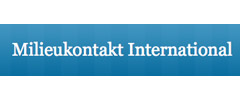WECF Expert Workshop in Brussels
"The Environmental Burden of Disease" focused on the relationship between increasing health problems and environmental pollution
25.05.2006 |Irma Thijssen
WECF Workshop Environmental Burden of Disease
Thursday 13 April 2006, 16 European health experts gathered in Brussels to discuss the environmental burden of disease. The workshop, organised by Women in Europe for a Common Future (WECF) focused on the relationship between increasing health problems and environmental pollution. How can we convince scientists and policy makers that there is a significant relation and that urgent measures need to be taken? A small commentary can be found below.
The Expert Workshop Report Summary can be found here.
The full report can be requested by contacting Irma Thijssen.
The discussion focussed on two issues:
1. A new paradigm needed. The scientific community is split between those hanging on toan old paradigm and those who have developed or are developing a new paradigm. The old paradigm, using the single-causality principle and traditional methods of epidemiology and toxicology, find that a very small portion of diseases can be linked to environmental factors (in many cases less than 5%). Policy makers base their actions on these assumptions.
However, the new paradigm, based on a multi-causality approach and research that looks at complex interactions and long term effects of low dose contaminations, taking into account vulnerable periods for effect, shows a much stronger relation between environmental factors and health effects. For cancer, some research results show that in more than half of all cases environmental factors play a crucial role in developing the disease.
2. Convincing policymakers and advisory institutions. The question then arose how we can convince other scientists and politicians, fixed in the old paradigm, of this significant relation? Firstly, it is important to acknowledge that there is and always will be controversies in research results. There will also always be uncertainties, but it is important to understand the extent and direction of these uncertainties. And to what extent are uncertainties manufactured or enlarged by interest groups to halt policy measures? We should maintain the precautionary principle, as science has its limitations and full proof can not be guaranteed.
Where there is already proof of adverse health effects of environmental factors, urgent measures need to be taken, without waiting for additional findings. Hence, EU policy makers should regulate and implement according to the precautionary principle and at the same time stimulate further research. They should take long-term health effects and uncertainties into account, not just short-term economic effects. They should also be aware of and assess manufactured uncertainties by Industry.
Other important recommendations by the experts to help convince the scientific community and policy makers include:
- focus on scientifically based communication, based onpublished data accepted by peer review committees, not only in scientific journals but also to policy makers and the general public (e.g. through newsletters of NGO’s)
- formulate a clear, consistent and convincing message
- avoid using the same message for all parites, but translate it to the individual audience
- emphasise effects on children, other vulnerable groups and demographic consequences
- don’t just focus on the problems, but propose solutions
- use facts and absolute numbers rather than percentages, both of environment related increase of diseases and other health effects
- show costs and benefits, also in absolute numbers, of proposed measures and use estimates from official EU policy publications
- focus on convincing Industry, as they are crucial actors (and can be allies) and are concerned about their liability to the public
The workshop is part of the project “Eco-efficiency and Sustainable Development; Women promoting the Environmental Pillar of the Lisbon Strategy and SDS”, in which WECF wants to engage citizens, particularly women, in the debate on how to advocate with convincing arguments to incorporate the SDS and protection of environment and health as overarching goals to economic competitiveness in the Lisbon strategy.
This is done through making the link between environmental pollution, the environmental burden of disease and their effects on Europe’s competitiveness. The outcome of this workshop will be used as input for discussion at a High-Level Roundtable, to be organised autumn this year, for which opinion leaders from ministerial and political, institutional, NGO and business level will be invited. The project is funded by the Netherlands State Secretary for Housing, Spatial Planning and the Environment.
Yvette Bellens/Marie Kranendonk
For more information: Irma Thijssen
WECF Workshop Environmental Burden of Disease
Donderdag 13 april 2006 – 16 Europese gezondheidswetenschappers en medici discussieerden in Brussel over de gezondheidseffecten van milieu vervuiling. De Workshop was georganiseerd door WECF. Belangrijke punten waren: hoe kunnen we wetenschappers, beleidsmakers en politici overtuigen dat er een significante relatie bestaat en dat er dringend maatregelen nodig zijn?
De discussie richtte zich op 2 punten:
1. Er is een nieuw paradigma nodig. De wetenschappelijke wereld is verdeeld in voorstanders van het oude en wetenschappers die eennieuw paradigma ontwikkelen. Het oude paradigma gaat uit het principe van 1 oorzaak > 1 effect en van traditionele methoden van epidemiologie. Hun bevindingen zijn dat slechts een klein deel van de ziektes kunnen worden gekoppeld aan milieufactoren (in veel gevallen minder dan 5%).
Beleidsmakers baseren hun acties op deze aannames. Echter, het nieuwe paradigma is gebaseerd op een multi-causale benadering en richt zich op onderzoek naar complexe interactie en lange termijn effecten van lage doses van stoffen, en houden rekening met kwetsbare periodes. Dit toont een veel sterkere relatie tussen milieufactoren en gezondheidseffecten. Voor kanker bijvoorbeeld tonen sommige onderzoeken aan dat in meer dan de helft van de gevallen milieufactoren een cruciale rol spelen in de ontwikkeling van de ziekte.
2. Het overtuigen van beleidsmakers en adviesorganen. De vraag kwam boven hoe we ander wetenschappers en politici die zich fixeren op het oude paradigma, kunnen overtuigen van deze significante relatie? Ten eerste is het belangrijk te erkennen dat er altijd controversies in onderzoeksresultaten bestaan. Er zullen altijd onzekerheden blijven, maar het is belangrijk om de omvang en inhoud van de onzekerheden te begrijpen. En in hoeverre worden deze onzekerheden door belangengroepen omarmd of uitvergroot?
We moeten het voorzorgsprincipe handhaven, want wetenschap heeft zijn beperkingen en volledige bewijzen kunnen niet worden gegeven. Waar reeds bewijs bestaat, moeten dringende maatregelen worden getroffen, zonder te wachten op extra onderzoek.
Dus zouden EU politici regulering en implementatie van het voorzorgsprincipe moeten voorstaan en tegelijk verder onderzoek moeten stimuleren. Zij zouden lange termijn gezondheidseffecten en onzekerheden in acht moeten nemen, niet alleen korte termijn en economische effecten. Zij zouden zich bewust moeten zijn van de rol die de Industrie speelt in benadrukken van de onzekerheden.
Andere belangrijkste aanbevelingen die bijdragen om de wetenschap en beleidsmakers te overtuigen:
- Focus op communicatie op basis van wetenschappelijke en geaccepteerde data, niet alleen in wetenschappelijke tijdschriften maar ook naar beleidsmakers en het publiek (bv via nieuwsbrieven of NGO’s)
- Formuleer een helder, consistent en overtuigende boodschap
- Vertaal de boodschap voor verschillende doelgroepen
- Benadruk het effect op kinderen, andere kwetsbare groepen en demografische consequenties
- Focus niet alleen op de problemen, maar geef ook oplossingen
- Gebruik liever feiten en absolute cijfers dan percentages
- Laat de kosten en voordelen zien van de voorgestelde maatregelen, ook in absolute getallen, en gebruik schattingen uit officiele EU beleidsdocumenten
- Richt je op het overtuigen van de industrie, want zij zijn cruciale actoren (en kunnen bondgenoten zijn) en zijn bezorgd over hun betrouwbaarheid bij het publiek.
De Workshop maakt deel uit van het project “Eco-efficiency and Sustainable Development; Women promoting the Environmental Pillar of the Lisbon Strategy and SDS”, waarin WECF burgers, en met name vrouwen, wil betrekken in het debat en beleidsbeinvloeding en overtuigende bewijzen in de SDS te integreren en bescherming van milieu en gezondheid als overkoepelende doelen in de economische competitie in de Lissabon Strategie op te nemen.
Dit doet WECF via het maken van een link tussen milieu vervuiling, de effecten van milieu vervuiling op de volksgezondheid en het effect op de competitiveness van Europa.
De resultaten van de workshop dienen als input voor de High-Level Ronde Tafel die WECF in October dit jaar organiseert en waarvoor opinieleiders op ministerieel niveau, uit politiek, NGO’s en zakenwereld worden uitgenodigd.
Het project is gesubsidieerd door het Nederlandse Ministerie van VROM (IMZ).
Yvette Bellens/Marie Kranendonk
Voor meer informatie: Irma Thijssen: irma.thijssen@wecf.org

































